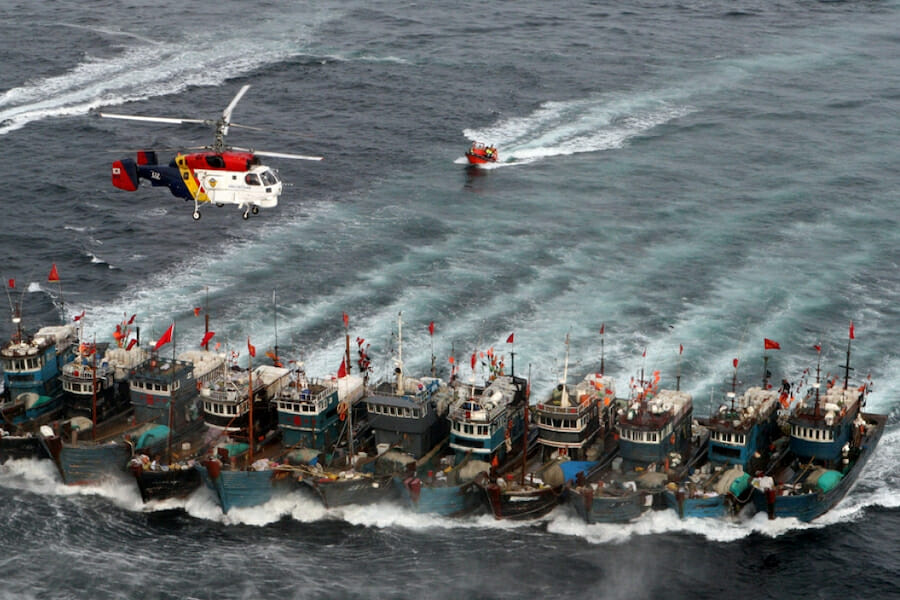
China’s Trawler Diplomacy
Yesterday, two South Korean coast guards officers were stabbed by a captain of a Chinese fishing boat accused of illegally fishing in ROK waters. One officer died after being brought to a hospital and the other is undergoing surgery for stabs in his abdomen. The South Korean Foreign Ministry promptly responded by meeting with Chinese Ambassador Zhang Xinsen where the Vice Foreign Minister Park Suk-hwan “strongly demanded that the Chinese government strictly clamp down on illegal fishing and the illegal acts of Chinese fishermen.”
The skirmish comes as one of the more violent clashes between South Korean authorities and a growing number of illegal Chinese fishing trawlers being found in the ROK’s Exclusive Economic Zone (EEZ). Earlier this year in March, the South Korean coast guard again clashed with two 30-ton Chinese boats near the island of Gyeongryeolbi.
The South Korean coast guard eventually boarded the trespassing trawlers, where they were met with swinging axes and hammers. One Chinese sailor was shot in the leg and was brought to a local Korean hospital. And then three months prior to that, off the island of Eocheong, another incident resulted with four injured South Korean officers, and two missing and one dead Chinese fisherman.
Just in the past four years, South Korea has arrested 1,887 Chinese fishermen, who were found illegally fishing in South Korean waters. In 2011 alone, 440 boats were seized, a 46% jump from the previous year. Efforts have been made by Seoul to clamp down on the illegal fishing by increasing fines and increasing the number of coast guards, all of which have done little to deter the incursion of Chinese boats.
Chinese fishers have been willing to pay high fines, up to $87,000, since their catches usually yield a much higher value. The recent event has intensified already growing South Korean public impatience over what is widely seen as unchecked Chinese aggression over sovereign territorial waters. A month ago, a major South Korea newspaper, the Chosun Ilbo, published a biting editorial calling for stronger measures against Chinese encroachment and criticizing the government’s all too “meek” policies as the “reason why China’s Foreign Ministry had the nerve to imply that these wholly justified arrests [of trespassing fishers] are ‘barbaric.’”
And today, the South Korean press has made the death and injury of two South Korean coast guard officers headline news, laying the groundwork for what may become a major diplomatic dispute. News reports have been covering everything from the family of the deceased officer to Chinese netizon responses to the incident. The President’s office has even announced that it was reconsidering its visit to China next month.
South Korea is not alone when it comes to illegal Chinese fishing on the high seas. In September of 2010, a Chinese trawler collided with a Japanese coast guard patrol boat in disputed waters off the Senkaku islands. The saga that followed was a high level diplomatic standoff between Beijing and Tokyo with nationalist sentiment flaring up in both countries. This past November, Japan again seized a Chinese fishing boat and its crew off its southwestern coast for illegal fishing.
Though this time the response from Beijing was far tamer, calling the incident a “regular fishery case” and calling on Japan to “ensure the legitimate rights and interests of the fisherman.” The territorial disputes in the South China Sea, which has entangled six countries, have also been riddled with squabbles due to Chinese fishers. This past June, an exploratory vessel for the Vietnamese Oil and Gas Corporation clashed with Chinese fishing vessels, which were accused of intentionally ramming into the exploration cables. Just this Sunday, the Philippine authorities have announced that they have arrested six Chinese fishermen, who had been illegally fishing in the country’s territorial waters. They were fishing for endangered sea turtles. If prosecuted, the six men face almost 20-year jail terms.
Not only have these incidents grown in frequency but they have also become markedly more violent. Ship ramming and physical fights against boarding coast guards have become commonplace during several of these incidents. And in many of the cases, Beijing has been slow to apologize and at times has even fallen in favor for its fishers, accusing its captors of violating international law. Time and time again, seemingly rogue Chinese fishers have served to spark major diplomatic showdowns, hitting off regional nerves regarding territorial sovereignty. And today, it appears to be South Korea’s turn. A spokesman from the South Korean Ministry of Foreign Affairs has demanded an official apology from China. China has accredited much of this activity to its inability to educate and control its fishers along its vast coast.
The Chinese fishing industry is a $45 billion enterprise and Beijing’s excuse may hold some truth, but it will do little to alleviate already growing tensions in the region. Especially, in a part of the world that is warily eyeing China’s military rise. Beijing’s non-action over its illegal fishing and violations of international maritime borders may only further purport the image of China growing aggressor in Asia.

